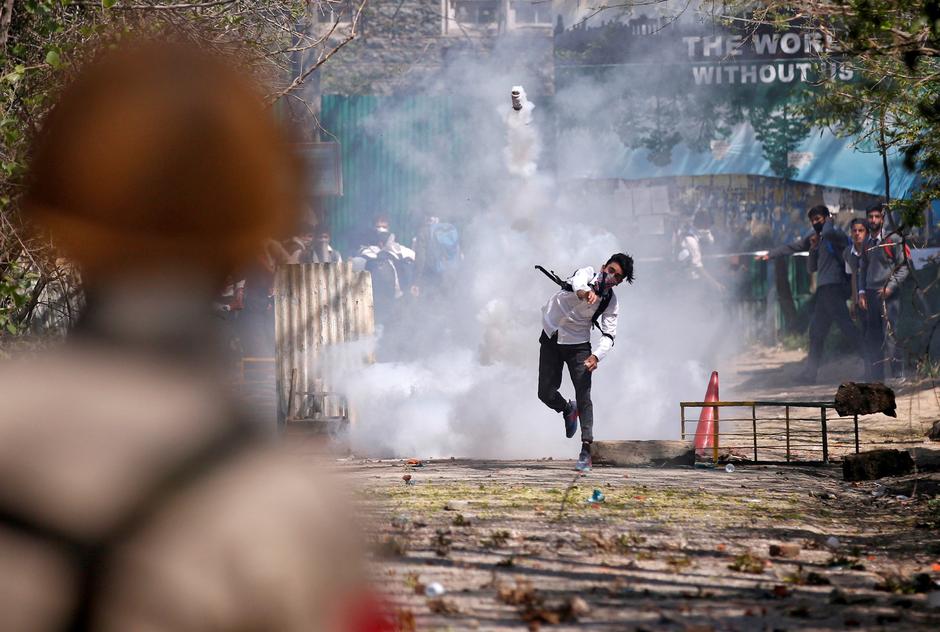
Now let’s get our bearings straight. India has re-occupied Indian Occupied Kashmir with an arrogance that promises an ultimate downfall. Pakistan is caught napping. There is pressure to do something – anything. The result: muddled thinking, befuddled planning and jumbled actions.
It does not have to be like this. We do not need to suffer from policy-paralysis. Instead, we can focus on sculpting a new and improved policy on Kashmir that internalizes three core lessons:
First, Kashmir is not merely an event or a process or even an issue – it is a cause. And causes do not subsist on timelines or deadlines. They don’t need to. The righteousness of the cause fuels its longevity, and ultimately its solution. We must remind ourselves of the absolute, undiluted and unalloyed righteousness of the Kashmir cause.
Second, a righteous cause can never be given up. Ever. It is the principle that is at stake here; a principle that is taught to every child in every society that claims to be based on decency, morality and virtue: Do the right thing. This principle must form the core of the Kashmir policy that we need to formulate now as we enter a new phase in the ultimate liberation of Kashmir.
Third, from within this core principle should sprout the operational part of the new policy. Guided by the righteousness and timelessness of the Kashmir cause, we can construct – brick by brick – short term, medium-term and long term goals of the new Kashmir policy. Having learnt from past experiences we should first wrap the new and improved policy around solid political consensus, and second, institutionalize it deep inside the core of Pakistan’s state structure. Institutions have deep memories and the new Kashmir policy must flow inside Pakistan’s institutional bloodstream. It should not repeat and be amenable to individual whims and fancies.
These three lessons point towards one single and unequivocal reality: Pakistan is laden with Kashmir options. But for these options to operationalize themselves, they should be painted inside the larger mural of our Kashmir strategy. Such a strategy should rely less on hollow emotionalism – no more Silly Fridays please – and more on a clear-eyed reading of reality as it exists today.
Indian Prime Minister Narendra Modi read this reality and decided the time was ripe for his re-occupation of occupied Kashmir. His reading of reality – in all likelihood – told him the following:
(a) The economic and perception differential between Pakistan and India was at the maximum
(b) The mandate differential between BJP and Opposition parties was at the maximum
(c) The military differential between Pakistan and India was checkmated by Pakistan’s nuclear prowess but Pakistan’s ability to fuel militancy in Occupied Kashmir was checkmated by FATF
Based on this reading, Modi may have reached the conclusion that he would never get a better opportunity to annex occupied Kashmir without worrying about domestic or international backlash and without being too concerned about Pakistan’s backlash.
What should we do other than clichéd speeches? Shorn of frivolous emotionalism, our hard reading of reality presents to us an actionable checklist. Some short term tasks are detailed here while the medium and long term ones will figure in subsequent columns.
In the immediate-to-short term, Pakistan can do the following five tasks:
1. Establish a strategic communication infrastructure to amplify the Kashmir cause in a professional, credible and authoritative way. India may lift the curfew in Re-occupied Kashmir at some point but it has shown that it can clamp down on means of communication at any point. Our aim now should be to ensure that we have the ability to keep the communication going with the people of Re-occupied Kashmir. Thanks to technology, there are plenty of ways to do this. We must establish broadcast and digital networks that can act as communication lifelines for Kashmiris in the occupied lands. India will obviously attempt to jam these communication signals but that’s where state ingenuity comes in. For starters, we should set up a “Radio Free Kashmir” in Muzaffarabad that beams into Re-occupied Kashmir and also keeps the world informed about every aspect on Indian re-occupation. The radio should broadcast in all relevant languages. At the same time, an office of Strategic Communications needs to be established in Islamabad under the direct supervision of the Prime Minister.
2. Pakistan should establish a digital set-up with the sole purpose of highlighting and magnifying the situation inside Re-occupied Kashmir. Kashmiris should be able to share – via their mobile phones and other digital devices – photos, videos, text and voice messages, stories, incidents, interviews, etc on these digital platforms so that the genuine and unfiltered picture of occupation is visible to the world. India will obviously try and block all such communication but that in itself presents a challenge that we must overcome. The possibilities of how we can leverage this digital Kashmir-only structure are endless.
3. Pakistan should declare in principle that it will encourage Kashmiris to embark on peaceful resistance against Indian occupation. Encouragement also includes guidance. There is plenty of literature available on the modes of peaceful resistance across the world. Sadly we do not have much of an institutional capacity to sift through such literature and distill practical wisdom out of it. This is perhaps what the Kashmir Cell in the Foreign Office should be doing among other things it claims it does. Enabling Kashmiris to persevere with resistance and keep the flame of liberation and freedom lit should be a key priority for us in the immediate-to-short term.
4. Pakistan should immediately re-establish the ‘red lines’ that India crossed when it bombed some trees and a crow in Balakot. Indians believe they have found some space under the nuclear threshold to strike Pakistan. We may not agree with them but if they believe so, they need to be disabused of this belief. Remember Indian aircraft crossed the international border, not just the LoC. That’s an act of war. In return, our fighter jets only crossed the LoC (perhaps not even that if the official account is to be believed). We need to ensure the Indians know that if they believe they opened a window under the nuclear overhang, that window has been slammed shut. How we do it is the job of the experts. In the immediate-to-short term, we must re-establish the pre-Balakot status quo.
5. Nuclear sabre-rattling by two-bit, irrelevant ministers is counter-productive. It’s also embarrassing. Instead, Pakistan needs to quietly but firmly communicate to India the consequences of any “misadventure” from India’s side regardless of how “limited” it is. Other than some strategic ambiguity that is necessary for deterrence, Pakistan should be as specific as possible in communicating the cost of any Indian misadventure that entails the crossing of the LoC, the working boundary or the international border. This message should be communicated not through jalsas and press conferences but – quietly and firmly – via Washington, Beijing, Moscow and London.
The principle is very simple: Kashmir cause is here to stay. In the pursuit of this righteous cause, we shall not falter and we shall not fail. Once we believe this, the rest are details waiting to be operationalised.
Published in The Express Tribune, September 15th, 2019.
Like Opinion & Editorial on Facebook, follow @ETOpEd on Twitter to receive all updates on all our daily pieces.
COMMENTS (2)
Comments are moderated and generally will be posted if they are on-topic and not abusive.
For more information, please see our Comments FAQ


1731655243-0/BeFunky-collage-(61)1731655243-0-165x106.webp)









To make a strong valid case, our Foreign Minister Mr. S.M. Qureshi must read the following statement of Lord Mountbatten, the last Viceroy of British India and the first Governor General of Independent India, on the occasion of signing of letter of allegiance with India by Maharajah of Kashmir. Following excerpt of the news is very relevant.-----Maharajah Hari Singh, ruler of the princely state of Jammu and Kashmir, had signed on 26 October 1947, Instrument of Accession to India and the then Governor-General of India, Lord Mountbatten accepted the accession with a remark, "it is my Government's wish that as soon as law and order have been restored in Jammu and Kashmir and her soil cleared of the invader, the question of the State's accession should be settled by a reference to the people." ....